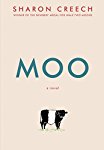Writing a novel written in verse is a challenge most authors would think twice about taking on. The wonderful thing is that this writing form seems to be gaining popularity. I see more and more novels written in verse every year, which I think is wonderful. Sharon Creech is a master of this form and I am delighted to bring you my review of her latest book, Moo. On these pages you will meet a stubborn cow, a difficult old lady, and two children who somehow have to figure out how to get along with them both.
 Moo
Moo
 Moo
Moo
Sharon Creech
Poetry
For ages 8 and up
HarperCollins, 2016, 978-0-06-241524-0
One summer’s day Reena, her brother Luke and her parents
are sitting in the family car stuck in a traffic jam. The noise, smells, and
heat of the city throbs around them. Reena’s mother then asks her husband a
question, one that ends up having huge consequences later. The question is, “do
you still like reporting?” It turns out that Reena’s dad doesn’t really like
his work anymore. Renna’s mother then suggests that they should “get out of
here,” and when her husband asks where they should move to, Reena is the one
who says that they should move to Maine.
To everyone’s surprise that is exactly what
they do. They sell up, pack up, and drive north, and soon enough they are
living in a small coastal town where Reena and Luke can safely ride their bikes
everywhere. They ride past a farm and watch as groups of teenagers work with
the animals, taking care of them as needed. Including the cows. The cows that
are so big and intimidating.
Reena’s mother
gets to know an elderly and rather eccentric lady called Mrs. Falala and she
asks her children to take her some books. Neither Reena or Luke want to go
because the old lady scares them, but they do as they are told. The visit does
not go well. Mrs. Falala upsets Luke, Reena comes to his defense, and both the
children are told to leave.
As a result of
this unfortunate encounter, Reena and Luke are volunteered (against their will)
to help Mrs. Falala “for a while.” What does that even mean? Reena is almost
afraid to ask. The first task the children are given is to shovel up piles and
piles of cow manure. To say that it is a disagreeable job is an understatement.
It is horrible, and Mrs. Falala does not thank the children for their help.
Instead, she tells them “Tomorrow: cow.” What does that mean? Then there is the
fact that they know “ZERO about cows.” The children’s parents think that this
is a perfect opportunity for Luke and Reena to learn about cows. Of course they
do.
Sure enough the
next day, after they have done a lot of chores, Luke and Reena see Zora the cow,
and Reena even pats her on the head. Cautiously. Mrs. Falala tells the children
that the following day they will “meet Zora for official.”
Reena and Luke’s
official first encounter with Zora shows the children that Zora is not a
friendly beast. Or a nice one. Or a compliant one. She is an ornery animal who
refuses to cooperate when Reena goes to bring her to the barn. Zora dodges the
rope Reena tries to throw over the cow’s head, chases the children, and even head-butts
Reena. When Mrs. Falala says that the children are “babies,” Luke loses his
temper, takes the rope, and neatly drops it over the cow’s head. Then Renna is
told to bring the cow into the stall. This does not go so well.
Roping and bringing
Zora into the stall is bad enough, but the next day Mrs. Falala says that she
is expecting the children to show Zora at the fair. Surely this is a joke.
Reena and Luke know nothing about showing cows at fairs. They have never even
been to an agricultural fair.
With each day
that they spend at Mrs. Falala’s place, the children learn something new about
cows, and farms, about Mrs. Falala, and about themselves. They never imagine
that their interactions with the crabby old lady and the difficult cow will end
up making their lives richer.
Written using a
combination of blank verse and prose, this wonderful book explores the ways in
which the lives of two children change when they move away from the city and
discover country living, and cows, for the first time. It is fascinating to see
how the children’s attitudes change as they get to appreciate their new home,
and how having new people and animals in their lives helps them to grow.
No comments:
Post a Comment